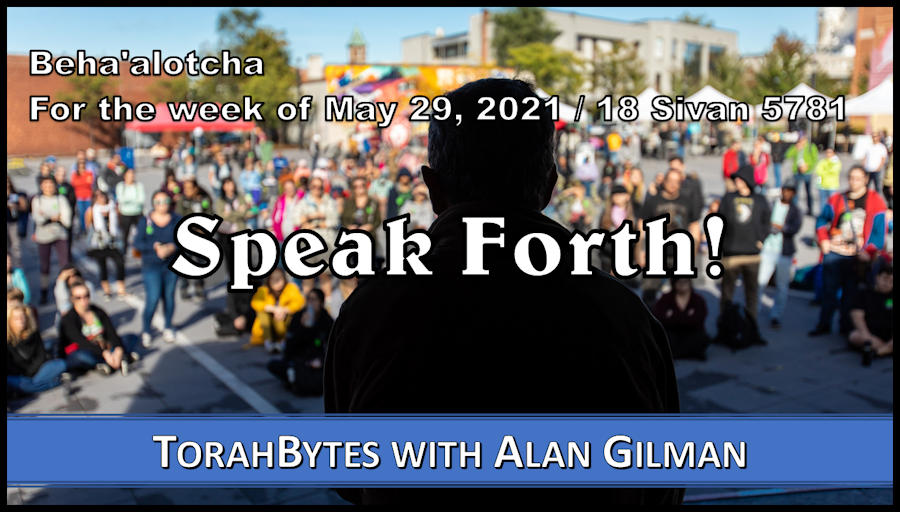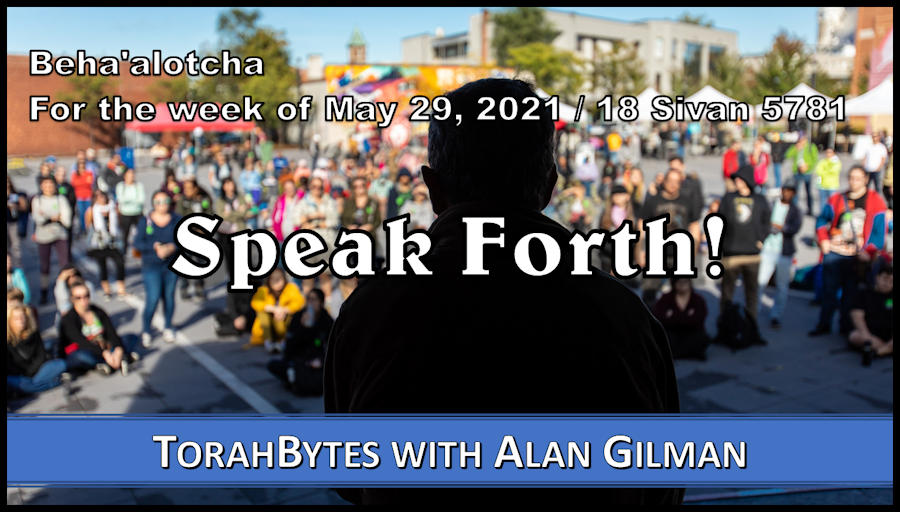
Speak Forth!
For the week of May 29, 2021 / 18 Sivan 5781
Beha’alotcha
Torah: B’midbar/Numbers 8:1 – 12:16
Haftarah: Zechariah 2:14 – 4:7 (English: 2:10 – 4:7)
Download Audio [Right click link to download]
Would that all the LORD’s people were prophets, that the LORD would put his Spirit on them! (B’midbar/Numbers 11:29)
This past Sunday in the Western Christian tradition, Pentecost Sunday was observed (June 20 this year according to the Eastern tradition). The term “Pentecost,” is derived from the Greek word for fifty. It refers to the Jewish festival of Shavuot, meaning weeks. Shavuot takes place seven weeks and one day (fifty days) after Passover. Pentecost Sunday commemorates the outpouring of the Ruach HaKodesh (the Holy Spirit) upon the followers of Yeshua in Jerusalem on the first Shavuot after Yeshua’s death and resurrection at Passover time.
Following the crowd’s reaction to the goings on of the disciples, Peter appropriately explained this phenomenon in terms of the promise of God spoken through the prophet Joel:
And in the last days it shall be, God declares, that I will pour out my Spirit on all flesh, and your sons and your daughters shall prophesy, and your young men shall see visions, and your old men shall dream dreams; even on my male servants and female servants in those days I will pour out my Spirit, and they shall prophesy (Acts 2:17-18; quoting Joel 3:1-2; [English: 2:28-29]).
Before I tie this in with this week’s parsha (weekly Torah reading), I need to clarify the essence of the phenomenon that occurred on this special Shavuot. Most readers would understandably focus on the speaking in other tongues, meaning languages. The nature of this and its contemporary use is a subject of much controversy. But for our purposes, I want to point out what the people were hearing rather than how they were hearing it. I am not saying that the how isn’t important; it’s that I would like us to focus on the what. Yes, the crowd was amazed to be hearing what they were hearing in their own language, but what were they hearing? According to verse ten of Acts, chapter two, they were hearing the Yeshua followers speaking forth, “the mighty works of God.”
If we could get over the theological conundrum over tongues speaking, we can see that what they were doing was what the Bible calls prophesying. This is why Peter referenced the promise from Joel about all types of people prophesying. And that is the tie-in between Pentecost and this week’s parsha.
The people’s complaining had gotten to Moses to the point that he wanted to die (11:15). God’s response was to have Moses gather seventy elders, so that they could help Moses bear the responsibility of the people. To equip them to do this effectively, God said he would take some of the Spirit that was on Moses and give it to these seventy elders. This indicates that Moses’ ability to lead had been imparted by God. The seventy would be similarly endowed with the power of God through his Spirit.
Note how these men reacted to the impartation of God’s Spirit: they prophesied (11:25). What form that took, we don’t know. But it is possible that they, like the Yeshua followers on Shavuot, spoke forth the mighty works of God. One could say this is a foretaste of Pentecost, but there’s more.
As it turned out, two of the seventy didn’t show up for the official impartation. For some reason they stayed with the rest of the camp. Despite their not being with the others, they prophesied anyway. This concerned Moses’ assistant, Joshua, who brought it to Moses’ attention in order to put a stop to this. But this didn’t bother Moses. In fact, his response was “Would that all the LORD’s people were prophets, that the LORD would put his Spirit on them!” (11:29). That’s the tie-in!
You may be aware that when Paul addressed the controversy of “tongues” with the believing community at Corinth, while the context was different from that of Moses, he expressed a similar sentiment. After Paul anchors his discussion on “spiritual gifts” in the centrality of love (1 Corinthians 13), he writes: “Pursue love, and earnestly desire the spiritual gifts, especially that you may prophesy” (14:1). He then affirms speaking in tongues, while stressing the great importance of prophecy by stating, “Now I want you all to speak in tongues, but even more to prophesy” (14:5).
It’s as if Moses’ heart resonated with God’s own, a desire that all his people would prophesy. Yeshua’s heavenly reception due to his death and resurrection resulted in God infusing his Spirit in his people to enable us to be conduits of his word. Whatever else followers of Yeshua are called to do, it stems from our foundational prophetic calling. The world needs to hear us speak forth the mighty acts of God.
All scriptures, English Standard Version (ESV)
